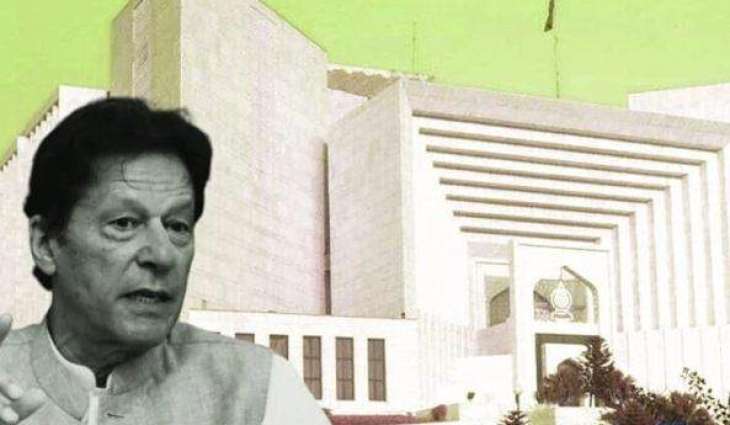Justice Hilali while addressing Imran Khan’s lawyer observes that his client used to say to talk to those in power
ISLAMABAD: (UrduPoint/Pakistan Point News-Feb 25th, 2025) Justice Musarat Hilali of the Supreme Court mentioned the statement of former Prime Minister and PTI founder Imran Khan regarding engagement with those who hold the real powers during the hearing of the intra-court appeal against the trial of civilians in military courts.
A 7-member constitutional bench of the Supreme Court, led by Justice Ameenuddin Khan, is hearing the case.
The arguments of Imran Khan's lawyer, Uzair Bhindari were held. At the beginning of the hearing, Justice Musarat Hilali remarked that during the time of Ayub Khan, was the constitution available? Were basic rights available during Ayub Khan's era?
Uzair Bhindari argued that basic rights were not available at that time either. Justice Hassan Azhar Rizvi remarked that an attack took place on military installations, and their security would be under the control of army personnel. Where there is military involvement, military courts would be included.
Uzair Bhindari argued that 103 individuals are being tried in military courts, to which Justice Hassan Azhar Rizvi remarked that they have seen footage on the media.
Uzair Bhandari argued that the court needs to decide how far the law can be extended in this case. Despite the 21st constitutional amendment, the court stated that the amendment was made due to specific circumstances. The constitutional protection must be given to apply the Army Act to civilians.
Uzair Bhindari argued that a military officer’s oath states that the officer's command is more important than life itself. Justice Hassan Rizvi said that you are saying that the military can only respond during war, not during an attack at home.
During the hearing, Justice Musarat Hilali had an important conversation about Imran Khan, the founder of PTI. Meanwhile, Advocate Uzair Bhindari argued that we need to move away from the mindset that only the military can do everything. He asked why the Corps Commander House wasn't defended when it was attacked.
Justice Musarat Hilali remarked that you are saying one thing, but your client says something else.
Justice Musarat Hilali had a conversation with the lawyer of the PTI founder, saying that your client says he will talk to those in power. To this, Imran Khan's lawyer, Uzair Bhandari, replied that he would not talk about what’s outside the courtroom.
Justice Musarat Hilali remarked that this is not politics; it's a matter of reality. Justice Ameen-ud-din Khan asked whether any member of the assembly raised their voice against the Army Act in the assembly. Has any member ever brought a private bill against the Army Act?
Uzair Bhindari argued that now the matter is before the court.
During the hearing, references were made to the decision of Justice Mansoor Shah regarding the extension of former Army Chief General Qamar Bajwa's tenure.
Justice Ameen-ud-din Khan remarked that Salman Raja referred to India in his arguments. Salman Raja mentioned that in India, appeals against military trials go to an independent tribunal. He questioned whether Parliament granted the right of appeal through legislation or whether it was a judicial directive.
Uzair Bhindari replied that he did not know about this.
Justice Muhammad Ali Mazhar remarked that we have the example of Kulbhushan Jadhav before us, where the right to appeal was granted through special legislation as per the International Court of Justice’s decision.
Justice Jamal Khan Mandokhail remarked that he had suggested a decision regarding the judges of subordinate courts, which led to a committee being formed in the High Court and interviews for judges of subordinate courts being conducted.
Justice Naeem Akhtar Afghan remarked that there is also the case regarding the extension of the former Army Chief's tenure. There was no law for the extension of the Army Chief's term, and the Parliament legislated on the Supreme Court's instructions.
Justice Ameen-ud-din Khan stated that everyone had to gather for a notification at that time, this was our situation. Uzair Bhandari mentioned the case of F.E. Ali, where Aitzaz Ahsan explained how trials were conducted, and even in jail trials, a piece of paper could not be taken. Justice Ameen-ud-din Khan remarked that if a piece of paper couldn’t be taken, where did the letters come from?
Justice Musarat Hilali remarked, “Yes, yes, nowadays there is also the controversy about letters,”. Justice Jamal Mandokhail said, “You should only argue on the matter of fundamental rights,”.
Uzair Bhindari argued that in court-martials, even the death sentence is awarded, and there are no set terms for judges, no training, and no legal understanding. The right to appeal against a sentence is not given, and only a mercy appeal can be made to the Army Chief.
A writ petition can be filed in the high court but its jurisdiction is limited.
With this, the arguments of Imran Khan's lawyer Uzair Bhindari were concluded, and the Supreme Court postponed the hearing of the military courts case until on Wednesday (tomorrow).
Advocate Faisal Siddiqui would begin his arguments on Wednesday.




